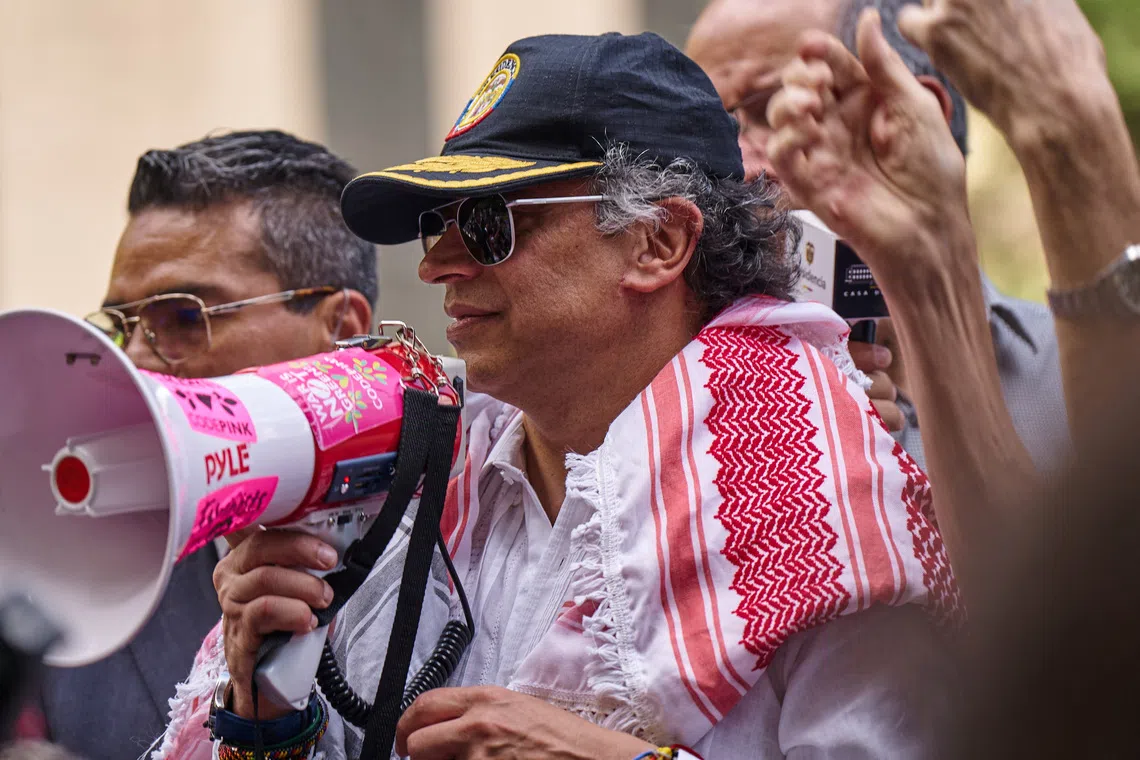US to revoke Colombian President’s visa over comments at pro-Palestinian gathering
Sign up now: Get ST's newsletters delivered to your inbox

Colombian President Gustavo Petro addressing pro-Palestinian demonstrators during the 80th UN General Assembly in New York on Sept 26.
PHOTO: REUTERS
Follow topic:
The US said it will revoke Colombian President Gustavo Petro’s visa after he took to New York’s streets on Sept 26 in a pro-Palestinian demonstration and urged US soldiers to disobey President Donald Trump’s orders.
“We will revoke Petro’s visa due to his reckless and incendiary actions,” the State Department said on X.
Mr Petro, addressing a crowd of pro-Palestinian protesters outside the United Nations headquarters in Manhattan, called for a global armed force with the priority to liberate Palestinians, adding: “This force has to be bigger than that of the United States.
“That’s why from here, from New York, I ask all the soldiers of the army of the United States not to point their guns at people. Disobey the orders of Trump. Obey the orders of humanity!”
Reuters could not immediately confirm whether Mr Petro was still in New York. His office and Colombia’s Foreign Ministry did not immediately respond to requests for comment.
UN clashes over Gaza war
The Trump administration has been cracking down on pro-Palestinian voices while countries including France, Britain, Australia and Canada have recognised a Palestinian state
Mr Petro, Colombia’s first leftist president and a vocal opponent of Israel’s war in Gaza, hit out at Mr Trump in his speech to the UN General Assembly on Sept 23, saying the US leader was “complicit in genocide” in Gaza and calling for “criminal proceedings”
Israeli Prime Minister Benjamin Netanyahu, addressing the assembly on Sept 26
Israel began its war against Hamas
Since then, Israel’s military campaign in Gaza has killed more than 65,000 Palestinians, according to the Gaza health authorities, and displaced the entire population of the narrow enclave.
Multiple rights experts say this amounts to genocide, a charge angrily denied by Israel, which says the war is in self-defence.
Palestinian Authority President Mahmoud Abbas addressed the UN by video
Mr Abbas’ office said at the time that his visa ban violated the 1947 UN headquarters agreement, under which the US is generally required to allow access for foreign diplomats to the UN.
However, Washington has said it can deny visas for security, extremism and foreign policy reasons.
Colombia’s rocky start with Trump
The US is Colombia’s main trading partner and its greatest ally in the fight against drug trafficking, but US-Colombia relations got off to a bad start shortly after Mr Trump returned to office in January, when Mr Petro refused to accept military flights carrying deportees in the US leader’s immigration crackdown.
Mr Petro said his country’s citizens were being treated like criminals. But he quickly reversed course, agreeing to accept the migrants, after both countries threatened tariffs on each other and after the US cancelled visa appointments for Colombians.
Mr Trump in September put Colombia on a list of countries that Washington says have failed to uphold their counter-narcotics agreements,
Mr Petro came to office in 2022 promising agreements with armed groups but pivoted in 2024, pledging to tame coca-growing regions with massive social and military intervention. The strategy has brought little success. REUTERS

